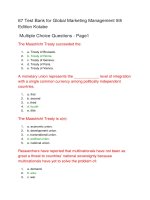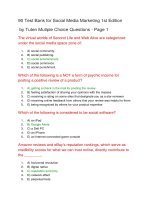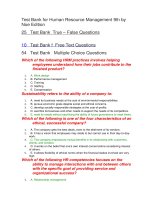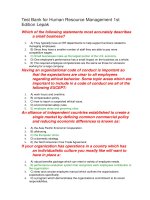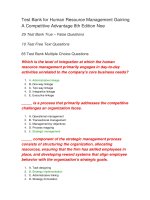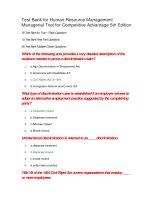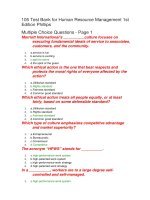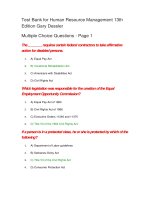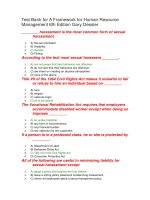97 test bank for human resource management 1st edition lepak
Bạn đang xem bản rút gọn của tài liệu. Xem và tải ngay bản đầy đủ của tài liệu tại đây (146.88 KB, 22 trang )
Test Bank for Human Resource Management 1st
Edition Lepak
Which of the following statements most accurately describes
a small business?
1.
2.
3.
4.
5.
A) They typically have an HR departments to help support functions related to
managing employees.
B) Since they have a smaller number of staff they are able to pay more
competitive wages.
C) Small businesses make up the largest portion of the U.S. economy.
D) One employee's performance has a small impact on the business as a whole.
E) The required employee competencies are the same as those for someone
working for a large company.
Having an organizational code of conduct is important so
that the expectations are clear to all employees
regarding ethical behavior. Some topic areas which are
important to include in a code of conduct are all of the
following EXCEPT:
1.
2.
3.
4.
5.
A) work hours and overtime.
B) compensation policy.
C) how to report a suspected ethical issue.
D) environmental safety rules.
E) employee dress and grooming rules.
An alliance of independent countries established to create a
single market by defining common commercial policy
and reducing economic differences is known as:
1.
2.
3.
4.
5.
A) the Asia Pacific Economic Cooperation.
B) offshoring.
C) the European Union.
D) a domestic strategy.
E) the North American Free Trade Agreement.
If your organization has operations in a country which has
an individualistic culture you mostly like will want to
have in place a:
1.
2.
A) robust benefits package which can meet a variety of employee needs.
B) performance evaluation system that recognizes each employees contribution to
the organization.
3. C) clear and concise employee manual which outlines the organizations
expectations specifically.
4. D) a program which demonstrates the organizations commitment to its social
responsibilities.
5.
E) bonus program which rewards work teams for meeting monthly quotas.
Organizational culture is most likely developed and
sustained by all of the following EXCEPT:
1.
2.
3.
4.
5.
A) the founder of the organization.
B) the history of the organization.
C) where the company headquarters is located.
D) the decisions made by management.
E) how new hires are oriented to the organization.
Ashley's productivity and attention to detail has seemed to
be declining over the past few weeks. She recently
moved into a new work area which is further down the
hall from your office so that she could be closer to her
work group. She has worked for you for two years and
you have not had any issue like this with her in the
past. Which of the following may best describe the
situation?
1.
2.
3.
4.
5.
A) She is spending more time on the Internet for non-work related activities.
B) She lacks the competency to complete her job tasks as assigned.
C) She should request to telecommute so she can focus more on her work.
D) She lacks work/life balance and is distracted by personal matters at work.
E) None of these are correct.
All of the following could be said about ethical behavior
towards employer stakeholders EXCEPT:
1.
2.
3.
4.
5.
A) it is important to be socially responsible in regard to how a company treats the
environment.
B) altering financial documents to increase shareholder wealth helps maintain
shareholder loyalty.
C) using unfair labor practices will impact a company's ability to attract and retain
quality staff.
D) providing training about how to communicate with different cultures helps foster
positive customer relationships.
E) giving a percentage of the proceeds from the sale of a limited time product to a
local charity shows a company values more than just profits.
Which statement best describes the difference between HR
activities versus HR practices?
1.
A) HR activities are described as the knowledge skills and abilities of the manager,
whereas the HR practices ensure that organizational goals are met.
2. B) HR practices must be externally aligned while HR activities must be internally
aligned.
3. C) HR practices are carried out using HR activities.
4. D) HR practices are put in place first, then HR activities must be determined.
5.
E) HR activities could be called the "tools" of a manager, whereas HR practices
could be referred to as an organization's "strategy."
Considering the latest labor force trends, select the
statement which is most likely to be correct.
1.
2.
3.
4.
5.
A) People are retiring early.
B) The white and Hispanic workforces are increasing at the same rate.
C) White males are no longer the largest group in the labor force.
D) Women will make up almost half of the labor force within the next 10 years.
E) The average age of the labor force is decreasing.
To help employees achieve work/life balance organizations
would most likely consider:
1.
2.
3.
4.
5.
A) offering on site day care so employees can quickly pick up their children and
get home sooner.
B) allowing employees to work flexible schedules in order to attend personal
appointments and activities.
C) providing employee discounts to area car dealers so they can save money on
their next purchase.
D) both A and B.
E) all of the above.
An example of internally aligning HR practices is:
1.
2.
A) implementing an employee dress code that increases customer satisfaction.
B) designing a compensation program which offers competitive wages in order to
attract and retain high quality candidates.
3. C) implementing a training program which supports the company's differentiation
strategy.
4. D) setting up the organization's reporting structure so that payroll and HR report to
the same senior executive.
5. E) creating a recruitment plan that targets the predominate groups in the
organization's labor market.
Mike received an adjustment to his wages today because his
supervisor explained that he would be taking on some
additional responsibilities since he has demonstrated
great effort and commitment to his work. What has just
occurred could be labeled as:
1.
2.
3.
4.
5.
A) interactional justice.
B) workforce planning.
C) social responsibility.
D) distributive justice.
E) procedural justice.
Human resources management and organizational culture
are closely linked for all of the following reasons
EXCEPT:
1.
2.
3.
A) human resources determines the type of culture an organization will implement.
B) human resources orients new employees to the organizations culture.
C) the type of organizational culture can help or hinder the work of human
resources.
4. D) human resources helps to select people whose values align with those of the
organization.
5. E) designing and implementing HR practices is impacted by the type of
organizational culture.
Sara operates her own beauty salon. Her prices are relatively
high compared to other salons in her area and she and
her staff specialize in color treatments and hair
highlighting services. All of the following could
describe Sara's salon EXCEPT:
1.
2.
A) employees are paid based on how many clients they serve each day.
B) her staff attends training in New York City to stay up to date with the latest hair
trends.
3. C) staff work together as a team to design new color treatments and options for
clients.
4. D) recruiting new staff involves selecting the top performers from area beauty
schools.
5. E) Sara provides bonuses at year end to those employees who design new
services which have been popular with the clients.
An organization pursuing a cost leadership strategy would
most likely have all of the following items in place
EXCEPT:
1.
2.
3.
A) specific job descriptions that clearly and concisely explain job expectations.
B) recruitment program which attracts candidates with entry level skills.
C) an extensive training program to teach employees every detail of the job to
ensure a quality product.
4. D) an employee evaluation program which rewards employees for achieving
productivity goals or meeting safety standards.
5. E) a compensation program which pays employees for each product completed
during their shift.
Which of the following items are types of organizational
demands?
1.
2.
3.
4.
A) Employee concerns and cost leadership strategy
B) Differentiation strategy and the aging workforce
C) Organizational culture and globalization
D) Technology and domestic strategy
5.
E) Social responsibility and labor force trends
The organizational demand of employee concerns most
closely relates to:
1.
2.
3.
4.
5.
A) a merger or acquisition and how the organization will create a new
organizational culture.
B) how employees view their relationship with the organization for which they
work.
C) employee involvement in deciding the strategy their organization will pursue.
D) the changing labor force trends and how the organization will be impacted by
them.
E) whether an organization pursues a global strategy and its impact on the
workforce.
The degree of inequality among the people of a country is
related to which cultural dimension?
1.
2.
3.
4.
5.
A) Individualism
B) Power distance
C) Masculinity
D) Uncertainty avoidance
E) Long term orientation
If you were to design an ethics training program for your
organization it would most likely include all of the
following EXCEPT:
1.
2.
3.
4.
5.
A) share the results of employees' background checks in order to identify those
who are most likely to violate the ethics policy.
B) a message from the CEO voicing support for the ethics program.
C) specific examples of what to do and what not to do in certain situations when
ethical issues arise.
D) describe how to confidentially report any perceived ethics violation within the
organization.
E) explain who the ethics officer is and what their role involves.
Companies which are at a later stage of development are
similar to large companies in that:
1.
2.
3.
4.
5.
A) they have more resources available for handling employee management
issues.
B) one employee's errors can cause a huge impact on productivity.
C) they are challenged with recruiting and selecting employees who can grow the
company.
D) policies and procedures are very informal and always evolving.
E) customer retention and expanding into new markets are not a concern.
A human resources department can support an organization
that is pursuing a differentiation strategy but doing all
of the following EXCEPT:
1.
2.
A) Training employees about the importance of producing a quality product.
B) Creating a compensation system that rewards employees who make no or few
errors.
3. C) Implement employee retention programs that keep good employees happy.
4. D) Design jobs that require entry level skill so that cheaper labor can be recruited.
5. E) Recruit employees who have a proven record for innovation and creativity.
External alignment is best described as:
1.
2.
3.
4.
5.
A) designing HR activities so that the organization is able to meet organizational
demand, handle external influences, remain compliant with regulations.
B) creating a reward and recognition program which retains top performing
employees.
C) training management staff on how to appropriately counsel employees using a
progressive discipline system.
D) designing a job so that it can be performed in the safest and most efficient
manner possible.
E) using company characteristics to determine the organizational culture and
values that will be followed.
When designing an employee bonus program all
departments must be considered to ensure that
everyone is being treated fairly and consistently. This
meets which criteria of procedural justice?
1.
2.
3.
4.
5.
A) Bias suppression
B) Representativeness
C) Correctability
D) Accuracy
E) Ethicality
Which of the following statements is most accurate
regarding unemployment?
1.
2.
3.
4.
5.
A) When there is a large number of workers available in the labor force then the
unemployment rate in that job market is high.
B) When there is a small number of workers available in the labor force then the
unemployment rate in that job market is high.
C) When there is a large number of workers available in the labor force then the
unemployment rate in that job market is low.
D) When the unemployment rate is high it is more difficult to find suitable job
candidates.
E) When the unemployment rate is low it is easier to find suitable job candidates.
HR system alignment means that:
1.
2.
3.
4.
5.
A) HR activities are designed to build upon each other to ensure that the right
people are doing the rob jobs at the right time.
B) the knowledge, skills and abilities of managers are used to accomplish the
goals of the organization.
C) HR activities are effectively used to carry out HR practices.
D) employees' attitudes and behaviors are monitored to ensure that no HR
practices are being violated.
E) organizations must focus on the internal alignment of their HR practices in
order to be successful.
Knowing which HR practice to use requires first
understanding which of the following?
1.
2.
3.
4.
5.
A) Using the wrong practice, or the right practice poorly, can cause more harm
than good.
B) No two companies are the same.
C) There is one best way to manage employees.
D) All of the above
E) Both A and B
As an employer you don't want to lose your baby boomer
work force due to the amount of knowledge and
organizational history they possess. You also want to
attract and retain younger workers who have updated
skills and fresh perspectives about the work. Which of
the following idea(s) may you want to consider?
1.
2.
3.
4.
5.
A) Consider offering retiree benefits to workers who remain with your organization
up to a certain age or number of years of service.
B) Create a mentor program which matches employees in similar age groups with
each other in order to develop employee relationships.
C) Provide student loan repayment programs for recent graduates.
D) A and C only.
E) A and B only.
Just based on the name of these organization's which one
most likely follows a differentiation strategy?
1.
2.
3.
4.
5.
A) Dina's Discount Dresses
B) Second Time Around Consignment Shop
C) Kitchenware Emporium
D) Eleanor's Elegant Evening Wear
E) Alfred's Affordable Antiques
Work / life balance is becoming more important to
employees due to the following reasons EXCEPT:
1.
2.
3.
4.
5.
A) the majority of women in the workforce have very young families.
B) the affordability of travel prompts people to request more vacation.
C) both parents work in the majority of households.
D) the needs for elder care is only going to increase.
E) single parents or non-traditional families are more prevalent now than 30 years
ago.
A psychological contract could best be described as:
1.
2.
A) the attitude the employee has towards their employer.
B) the employee's perception of how fairly they are being treated by their
employer.
3. C) routine counseling provided to an employee for behavioral issues.
4. D) the employee's expectation as to what the company will provide them in return
for their contributions to the company.
5. E) the personality traits the make up an employee and how they impact their work.
If an overseas country's unemployment rate drops what may
a U.S company consider doing?
1.
2.
3.
4.
5.
A) Raising its wages to attract workers to their organization and away from their
competitors.
B) Making no change to wage and benefits offered due to the poor economy.
C) Pulling out of the overseas country and find a location with a higher
unemployment rate.
D) Adding additional positions to its overseas operation to stimulate the economy.
E) Both A and C
Establishing independent business units in several countries
is known as a:
1.
2.
3.
4.
5.
A) domestic strategy.
B) multinational strategy.
C) transnational strategy.
D) global strategy.
E) international strategy.
Before deciding to move the assembly of its computer
components overseas, BCD Industries should have
taken all of the following into considerations it relates
to managing its employees EXCEPT:
1.
A) the cost of labor in the U.S compared to the overseas company for this specific
type of work.
2. B) the amount of unemployment claims it may have if overseas employees have to
be downsized.
3. C) the skill level of the labor force in the overseas country.
4.
D) the culture of the overseas country and how it might impact the work ethic of its
employees.
5. E) the availability of employees to do this type of work in the overseas country.
The owner of J & J Car Dealership has always encouraged
his sales staff to be competitive and he has always
taken a "hands off" approach when managing his
employees. The sales staff dresses casually and has
very flexible schedules. All of these things describe
the company's ________
1.
2.
3.
4.
5.
A) environmental influences.
B) social responsibility.
C) labor force trends.
D) organizational culture.
E) differentiation strategy.
As time passes and a company moves along its organization
life cycle, which of the following may be an accurate
statement about the company?
1.
2.
3.
4.
5.
A) Rules become more formalized.
B) There is a strong entrepreneurial spirit among the management staff.
C) Employee performance must be more closely monitored.
D) There are less regulatory issues with which to be concerned.
E) A and C are correct.
A manager can impact how an employee reacts to a
perceived injustice most greatly by:
1.
2.
3.
4.
A) eliminating any type of formal grievance process.
B) establishing an open and trusting relationship with the employee.
C) having set office hours so employees know when they are available.
D) conducting an employee satisfaction survey and following up with staff only if
issues are identified.
5. E) completing exit interviews with those identified as top performing employees.
Jack's family runs a farmer's market that has been in the
family for nearly 75 years. The expectation is that Jack
will some day take over managing the family business
and keep traditions that have been established
regarding quality, customer service and giving back to
the community. The culture in which Jack lives most
like relates the the cultural dimension of:
1.
2.
A) short term orientation.
B) masculinity.
3.
4.
5.
C) power distance.
D) collectivism.
E) individualism.
The organization you work for has a policy that employees
are promoted from within before external candidates
are considered for job openings. This type of policy
most directly impacts the:
1.
2.
3.
4.
5.
A) psychological contract.
B) organizational culture.
C) organizational strategy.
D) labor force trends.
E) job design.
If your organization has operations in a country which has
an uncertainty avoidance culture you mostly like will
want to have in place a:
1.
2.
A) robust benefits package which can meet a variety of employee needs.
B) performance evaluation system that recognizes each employees contribution to
the organization.
3. C) clear and concise employee manual which outlines the organizations
expectations specifically.
4. D) a program which demonstrates the organizations commitment to its social
responsibilities.
5. E) bonus program which rewards work teams for meeting monthly quotas.
Telecommuting can have all of the following impacts
EXCEPT:
1.
2.
3.
4.
5.
A) help employees manage their work and personal lives better.
B) allow the employer to recruit from a larger pool of applicants.
C) strains personal relationships in the workplace.
D) enhances communication between the telecommuter and their supervisor.
E) decrease employee loyalty to the organization.
Generic or store-brand products could be said to be using a
________ strategy when competing with the more
expensive, top of the line products in the same store.
1.
2.
3.
4.
5.
A) cost leadership
B) product
C) economic
D) differentiation
E) high profit
When the job offer was made to Amanda, the HR Manager
based her starting salary on her having 11 years of
experience. After Amanda started her supervisor found
out that she really has 17 years of experience which
puts her in a higher salary category. To save money,
the supervisor never shared this information with the
HR Manager, and thereby violated which procedural
justice criteria?
1.
2.
3.
4.
5.
A) Bias suppression
B) Representativeness
C) Correctability
D) Consistency
E) Accuracy
Jose's supervisor often reprimands him in front of his
coworkers, does not return his calls or emails when he
has a question, and communicates process changes
to his coworkers, leaving Jose left out. Jose's
supervisor has not demonstrated appropriate:
1.
2.
3.
4.
5.
A) interactional justice.
B) procedural justice.
C) ethical behavior.
D) distributive justice.
E) bias suppression.
BCD Industries has made arrangements to have the
computer components tat they manufacture be
assembled overseas. This is an example of:
1.
2.
3.
4.
5.
A) a transnational strategy.
B) a domestic strategy.
C) a global strategy.
D) telecommuting.
E) offshoring.
As an employer the best way(s) to encourage ethical
behavior is/are:
1.
2.
A) pressure employees to get involved in projects such as Habitant for Humanity.
B) role model ethical behavior so that employees will mirror it and make good
decisions.
3. C) allow employees to use company property for personal interests.
4. D) share positive information with employees about the organization and keep
negative information confidential.
5.
E) both B and D.
A large soft drink company wants to expand their market to
other countries. They don't plan to make any changes
to their product or focus on any particular country.
This organization could be described as following
which strategy?
1.
2.
3.
4.
5.
A) Domestic
B) Multinational
C) Transnational
D) Global
E) International
Marcus comes from a culture where personal achievement is
very important and is rewarded more so than team
accomplishments. Marcus most likely is from which
type of culture?
1.
2.
3.
4.
5.
A) Masculinity
B) Uncertainty avoidance
C) Collectivism
D) Individualism
E) Long term orientation
When following a cost leadership strategy a manufacturing
organization would most likely have which of the
following?
1.
2.
3.
4.
5.
A) High employee turnover due to limited growth opportunities and repetitive
nature of the work
B) Short and simple job descriptions
C) Training programs that focus on basic employee skills
D) Compensation programs that pay employees a set dollar amount for each item
they produce
E) All of the above
Company's strive to have a culture which is aligned with
organizational objectives so that employees are willing
and able to contribute to the company's success. An
example of a situation when culture and goals may not
align is:
1.
2.
3.
4.
5.
A) when changes to the compensation program are implemented.
B) after the recruitment of a new manager.
C) during company-wide diversity training.
D) when new job descriptions are handed out.
E) right after a merger occurs.
25 Free Test Bank for Human Resource Management
1st Edition Lepak True - False Questions
You are working overseas for your company and have asked
an employee to complete a certain task but did not
provide them with specific instructions. The employee
now seems anxious and tense and has been asking
you questions all day about how to proceed. You are
probably in an individualistic culture.
1.
2.
True
False
A manager who types an e mail or answers his phone while
another employee is meeting with them in person is
not demonstrating interactional justice.
1.
2.
True
False
With the number of younger workers entering the work force
organizations should have no difficulty with
appropriate work force planning since there will be an
even larger supply from which to pick.
1.
2.
True
False
Capturing an organization's culture is writing is not of
critical importance, as most culture comes from
watching how employees communicate with each
other, with their customers, and how their managers
provide direction and guidance.
1.
2.
True
False
If your supervisor asks you to fix some numbers on a
financial report so that the results appear more
favorable they have asked you to act in a socially
irresponsible manner.
1.
2.
True
False
Many companies ship their work oversees to countries like
Taiwan because people in that country are known to
be more productive and efficient in their work, thereby
saving the company money.
1.
2.
True
False
Both Wal-Mart and Target can be considered the cost leaders
in their industry.
1.
2.
True
False
Companies that are newer to their market are most
concerned with retaining customers, while more
established companies are more focused on how their
business is growing.
1.
2.
True
False
Companies within the same industry share the same types of
culture and strategy.
1.
2.
True
False
Employees who work for an organization that follows a cost
leadership strategy generally hold jobs which are
simple and clearly defined.
1.
2.
True
False
Using text messaging to communicate with field sales
representatives demonstrates one way in which
technology has impacted how communication occurs
within an organization.
1.
2.
True
False
When following a differentiation strategy a company must
convince its potential customer that the price of the
product or service does not matter.
1.
2.
True
False
NAFTA was enacted to help remove trade barriers between
the European Union and the United States.
1.
2.
True
False
The "baby boomer" generation has retirement on their mind
and companies should find ways to help them exit the
organization quickly.
1.
2.
True
False
A large pharmacy chain that only has stores within the
United States could be said to be following a domestic
strategy in regard to the type of market it has chosen
to serve.
1.
2.
True
False
Small businesses have little impact on the industries they
are a part of or on the larger business world and
economy as a hole.
1.
2.
True
False
Employees of a small business are often easier to manage
due to the lower number of employee issues and the
decreased impact that employee performance issues
will have on the overall outcomes of the business.
1.
2.
True
False
Since ethics and social responsibility are more internal to an
organization they have limited impact on the bottom
line and reputation of an organization.
1.
2.
True
False
Offering a unique menu, a specialty drink, or offering to give
a customer a free meal on their birthday may be
approaches that a restaurant might try to make it stand
out from other local restaurants and thereby creating a
competitive advantage.
1.
2.
True
False
A society that values things such as solidarity, quality of life
and service would be described as a masculine
society.
1.
2.
True
False
If an organization has an entrepreneurial type of culture it
would value such things as being innovative, creative,
and sharing knowledge.
1.
2.
True
False
Telecommuting is a way to help employees establish close
and lasting relationships with coworkers and make
them feel connected to the organization.
1.
2.
True
False
Providing diversity training in the years to come will be key
to helping companies teach employees how to learn
from and appreciate the different perspectives
throughout the work force.
1.
2.
True
False
An employer that ensures their internal transfer process for
employees is fair is ensuring that distributive justice is
being carried out.
1.
2.
True
False
You strictly enforce with employees that they must follow the
"chain of command" when they have a question or
issue that needs to be addressed. You are most likely
in a high power distance culture.
1.
2.
True
False
23 Free Test Bank for Human Resource Management
1st Edition Lepak Free Text Questions - Page 1
________ and ________ are the fastest growing groups in the
labor force, with the number of ________ in the labor
force is expected to grow by about 9% by 2016.
Answer Given
Hispanics; Asians; women
A single mother of two teenage boys who are actively
involved in after-school activities is looking for a job
that can offer ________ so that she can juggle her
busy schedule effectively.
Answer Given
work/life balance
Factors within an organization that influence how employees
are managed are known as organizational ________.
Answer Given
demands
An organization that focuses on designing the most efficient
processes and rewards employees for identifying cost
savings ideas is pursuing a ________ strategy.
Answer Given
cost leadership
________ justice is achieved by offering a fair compensation
and benefits package, while ________ justice is
achieved through consistently and fairly carrying
employee disciplinary and evaluation processes.
Answer Given
Distributive; procedural
HR activities are established to help companies handle
________ demands, ________ influences, and
________ issues.
Answer Given
organizational; environmental; regulatory
Thinking long term by focusing on ways to develop
employees and encourage creativity are
characteristics of a company pursuing a ________
strategy.
Answer Given
differentiation
Feeling as though you owe something to the organization
you work for and that the organization should in turn
owe you something creates a ________ between your
and your employer.
Answer Given
psychological contract
Jones & Sons accounting firm has been in business since
1964 and employees a staff of 12. This information
about Jones & Sons is describing its ________.
Answer Given
company characteristics
The fact that the company's founder grew up working on his
family farm and having a strong work ethic was
instilled in him from when he was very young, will
have a dramatic impact on his company's ________
and he will have the same expectation of his
employees.
Answer Given
culture.
The number and type of individuals available to work is
known as the ________ and as we approach the year
2016 there will be less growth in the ________
workforce as opposed to the ________ workforce.
Answer Given
labor force; younger; aging or older
23 Free Test Bank for Human Resource Management
1st Edition Lepak Free Text Questions - Page 2
Many companies turning to computer-based training to help
employees learn job skills demonstrates the impact
that ________ has had on the methods used to educate
employees.
Answer Given
technology
________ is one possible method for companies to use
technology to expand their pool of qualified applicants
for "hard to fill" positions.
Answer Given
Telecommuting
A company who establishes independent business units in
several countries in order to meet the needs of the
local country is pursuing a ________ strategy, whereas
a company who is not concern with local preferences
but focuses more on offering standardized products
across several markets is pursuing a ________
strategy.
Answer Given
multinational; global
Describe three ways in which technology has impacted HR
practices.
Answer Given
Many business transactions are now completed on line therefore employee's must
be computer literate in order to remain productive and provide appropriate
customer service. Abuse or misuse of the Internet at work impacts employees
behaviors and attitudes thereby creating employee disciplinary issues. Employee
work relationships and communication may be strained or not as personal due to
the reliance on email, teleconferencing, videoconferencing etc. Telecommuting
employees may cause resentment from non-telecommuters but may also enhance
work/life balance an employee satisfaction for those that conduct work this way.
In addition to employees, shareholders, the community and
the environment the remaining stakeholders an
organization should be concerned with when
establishing standards related to ethics and social
responsibility are ________, ________, ________, and
________.
Answer Given
governance; diversity; human rights; product
You are an HR Manager in charge of preparing your
organization for impact of labor force trends. Given
what you learned in this chapter about how labor force
trends will impact employers describe four ideas will
you be presenting to your VP of HR to address the
impact of these trends.
Answer Given
Offer Spanish and English course for your employees to enable them to better
communicate with each other. Offer a phased out retirement plan in order to retain
the highly qualified older work force longer. Provide training to the older workforce
on the latest technology and job skills so they keep current with their profession.
Develop a mentor program where older workers mentor and train the younger
workers. Provide diversity training to all staff so that everyone is accepting of the
variety of cultures and ethnicities that will make up your work force.
Describe three things which help to create an organization's
culture? Once defined, what types of things are
impacted by an organization's culture?
Answer Given
The values and beliefs of the organization's founder and decisions made in the
early stages of development, the history of the company and any challenges faced
along the way, and the actions of the management team all create an
organization's culture. Things such as rules, written and unwritten, communication
methods and styles, customer service philosophy, HR practices, creativity,
innovation, competitiveness, team orientation and more are all impacted by the
organization's culture.
Briefly describe the organizational culture of a company you
have worked for or know well (i.e., perhaps the
employer of a friend or family member). How did the
culture impact employees and the work being done?
Answer Given
Answer should include such things as references to values and beliefs of the
organization, how they were established, how they were transferred to the
employees, how work was affected, and whether it was viewed as a positive or
negative culture.
Identify the two factors that impact operating in a global
environment. Describe two basic challenges an
organization faces regarding each factor.
Answer Given
Economic Considerations: Compensation will differ based on the country an
organization operates in, even if employees are performing the same job in the
organization's home country. Recruitment and selection of employees will differ
based on the available work force in each country and the skill level of that
workforce. Cultural differences: How men and women are viewed in the workplace
and whether they are able to hold positions of authority and power will impact how
employees are managed. How much structure and rules are valued by certain
countries, will impact how work is accomplished and whether employees are
willing to abide by the rules set forth.
What is meant by the term work/life balance? Describe four
examples of what an organization can do to create this
for its employees.
Answer Given
Work/life balance is an employee's ability to balance the demands of work and the
demands of their personal life. Some things an organization could offer to assist
employees with this concern are offer flexible scheduling options, provide on site
day care or discounted day care options, provide employee discount programs for
local restaurants, attractions, family activities, etc., offer employee benefit
programs that focus on families, offer elder care options or time off for elder care,
provide personal leaves of absence for employees to attend to family or personal
matters, offer a fair vacation or time off policy, etc.
If an organization is pursuing a strategy of differentiation, is
relatively large, is growing rapidly and has a relatively
formal and conservative culture, what type of
approach might it most likely be taking in regard to
how it designs and implements it HR practices. Give
examples of at least three HR practices and how they
would be impacted.
Answer Given
Recruitment would be carried out in a very tradition way using employment
advertisements, perhaps recruiters, and networking. The interview process would
be very structured and candidates would be expected to be very professional and
polished. Compensation would probably be ahead of what competitors pay in
order for them to attract top candidates to carry out the differentiation strategy. Pay
would reward individual and team accomplishments and long term results. HR
policies related to employee behaviors would be defined in detail and expected to
be carried out in a very formal and authoritative way.
Describe five steps an organization can take to support
ethical behavior by its employees. What impact can
these steps have on the organization as a whole?
Answer Given
Appoint an ethics officer. Monitor the organization's culture as it relates to its
values and ethics., provide employees with training about the companies values
and ethics standards, complete background checks on new employees, and
communicate with employees on-going about appropriate ethical behavior via
employee newsletters, staff meetings, etc. An organization which follows these
steps and promotes ethical behavior can see benefits such as low employee
turnover, employee and customer satisfaction, increased profits, and decreased
amount of employee behavioral issues.
